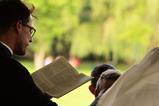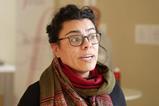Tony Campolo relentlessly challenged the Church to take the words of Jesus seriously and to serve “the least of these”. Peter Meadows says he will be remembered as a preacher who was used by God to make Christians feel uncomfortable

It was the talk’s title that grabbed me.
Something about ‘A Christian Response to Corporate Sin’ but in snazzier language. It came with the invitation to purchase the recording, which featured a Tony Campolo.
For me, sin had always been personal. So this had to be heard. The cassette duly arrived from the US. And a passionate, rasping, torrent of words blasted from the speakers of my Ford Cortina. Such was the force, I had to park to soak in the message.
Assailing me were stories of stolen umbrellas, a lady’s scarf caught in his zipper and a car boot full of canoe paddles and chicken dung. These were infused with swathes of scripture and practical application that brought laughter to my lips, tears to my eyes and hope to my heart.
Such was my introduction to Tony Campolo who, for decades after this moment, deeply influenced the cause of Christ in the UK and across the world. It also led to him speaking at the UK’s annual Spring Harvest festival year after year after year.
A marker of Tony’s influence came at that event years later. I asked 4,000 attendees in its Big Top, “How many of you are from a church that had a social action programme a decade ago?”
The response was minimal. But when I asked how many were in such churches now, an amazing forest of hands was raised.
In a short time had come a dramatic change for tens of thousands of believers and thousands of churches, with Tony’s contribution having played a major part.
From fundamentalist to evangelical
Anthony Campolo Jr was born to Italian immigrant parents on February 25, 1935, in West Philadelphia, USA.
Interested in science, Tony won second place in the National Science Fair at the age of just 14. This led to meeting Albert Einstein – which he later said, “had a lasting effect on my mind, my imagination, and my theology”.
He went on to benefit richly from studying sociology at Eastern University, where he eventually become a professor.
In his youth, Tony Campolo was part of a fundamentalist church before transitioning to being evangelical. When evangelicals in the US veered to the political right, eschewing social action, he identified as a ‘red letter Christian’ reflecting the way some Bibles rendered Jesus’ words in red.
If Jesus had $40,000 and children were starving, what kind of car would he buy?
He would say, “I place my highest priority on the words of Jesus, emphasising the 25th chapter of Matthew, where Jesus makes clear on Judgment Day the defining question will be how each of us responded to those he calls ’the least of these’.”
This priority was reflected in Tony’s some 500 speaking engagements a year. He reminded audiences of the 2,000 Bible verses calling for the care of the poor and oppressed. And he posed uncomfortable questions such as, “If Jesus had $40,000 and children were starving, what kind of car would he buy?”
The need to act
In his theological memoir Pilgrim (William B. Eerdmans) Tony explains how studying both sociology and theology shaped him. “Sociology raised all the right questions and theology provided all the right answers,” he wrote.
In the US, many evangelicals struggled with teaching that to them sounded like socialism, even though deeply rooted in the words of Jesus. Tony even faced a trial for heresy. Though vindicated, the fall-out damaged his career there as well as the ministries counting on him to raise funds. His later change of mind on sexuality was also contentious.
But when it came to the key issue of serving the poor, Tony received a very positive response in the UK, where churches were awakening to their need to act justly and compassionately. This was due to the influence of the 1974 Lausanne Covenant stressing the Gospel must involve both word and deed, the Evangelical Alliance’s calls for a revival of the social conscience modelled by William Wilberforce and the Clapham Sect, and the fledgling evangelical relief agency Tearfund helping churches see the need to act.
Tony poured his fuel on these emerging flames and history was written.
Tributes
The former Archbishop of Canterbury, Rt Rev George Carey explains Tony’s impact, “Behind the humour and stories was a very serious person. Tony’s mix of theology and sociology made him an effective communicator of big ideas. He embodied orthopraxy - right action - as opposed to just orthodoxy - believing the right thing.”
Alongside a myriad of small, personal stories making up the Campolo legacy in the UK is the growth and impact of the Oasis Trust. Founded by Baptist minister Steve Chalke, today it has some 6,000 staff creating change for children, young people and their families in the UK and globally.
Steve regards Tony as his, “most important mentor and example”. Citing Tony’s inspiration in developing the Oasis Trust and in his personal growth as a leader he says, “Like so many others, I owe him a huge debt.”
For 40 years Tony led the Evangelical Association for the Promotion of Education (EAPE). This served some of the world’s poorest communities. And gave thousands of Christians the transforming experience of serving those impacted by poverty and injustice.
He also engaged politically. As an advisor and friend to President Bill Clinton, he offered faith-based policy ideas at the highest level. In the UK, he engaged with Secretary of State Clare Short during the Jubilee 2000 campaign to cancel the debt of the poorest countries. He even prayed with her in her office.
As Professor of Sociology at Philadelphia’s Eastern University, Tony founded the Campolo Center for Ministry to provide scholarships and support to students wanting to be used by God in the world. One of many to benefit, particularly from its focus on politics, is Marvin Rees, who became the two-term Mayor of Bristol.
Marvin says, “Tony gave me a gateway in from my faith to the big political discussions, confirming there is a place where faith hits the world as it is being run in terms of hierarchy, power and inequality.” For Marvin, Tony’s reflection on the parable of the sheep and goats was “blunt, powerful and even brutal, with its challenge that the final test will be ‘what did you do for the least of these?’” He adds, “These things coursed through me when I became Mayor of Bristol. And because I’d seen the things Tony had done in the real world I could operate with a sense of confidence and dignity.”
A true prophet
Tony’s activism was powered by a deep intimacy with Christ, nurtured over years, rather than from a dramatic conversion experience. Each morning, he’d spend time centering on Jesus, sometimes repeating his name for as much as half an hour.
Tony was generous. Though author of 50 books he never used his platform time to plug them, instead choosing to promote the ministry of others. One outcome is tens of thousands of children in poverty being sponsored.
Tony leaves his wife Peggy Davidson, who he married in 1958, a son Bart, and a daughter Lisa.
Tony Campolo’s death also brings the loss of one of the church’s most influential leaders, who moved people from a privatised faith to one of active compassion. Former Youth for Christ President Jay Kesler called Tony “one of the few authentic prophets in our society,” a fitting tribute for a man whose legacy will endure.




































2 Readers' comments